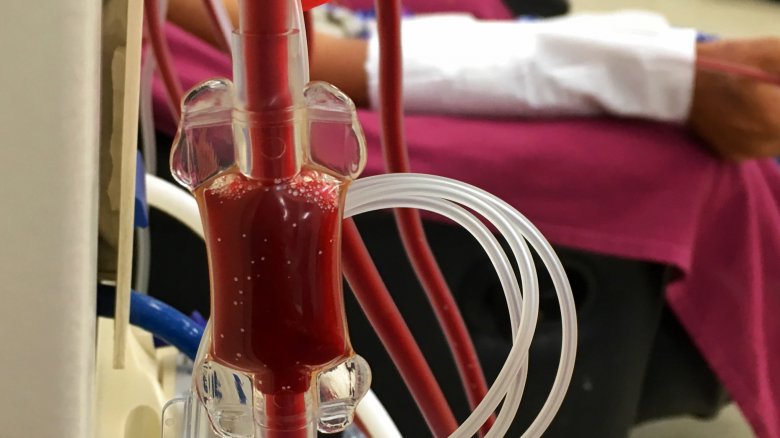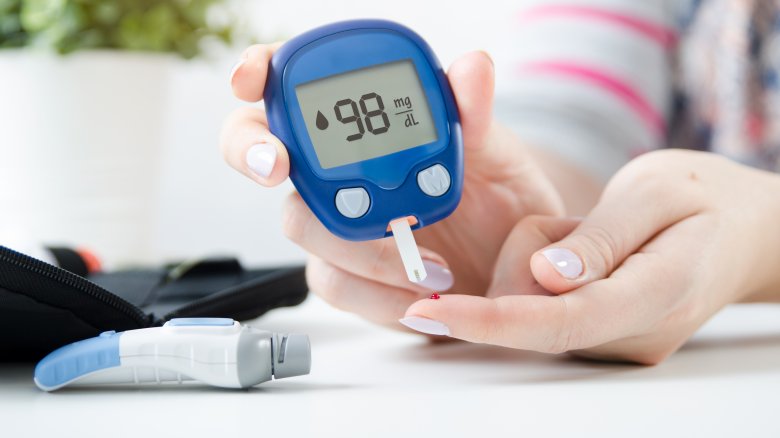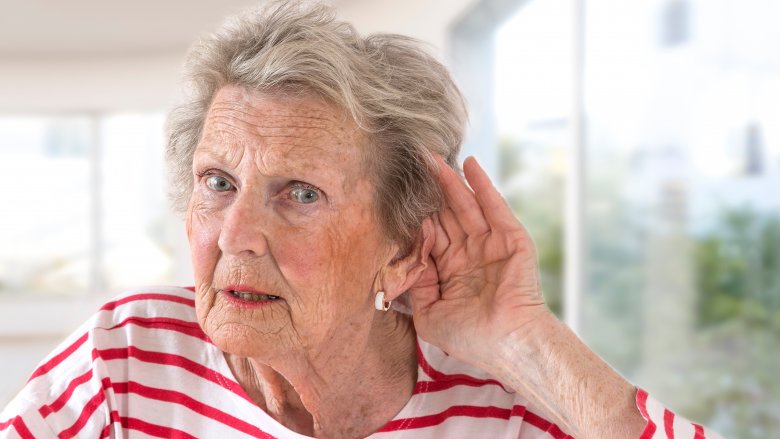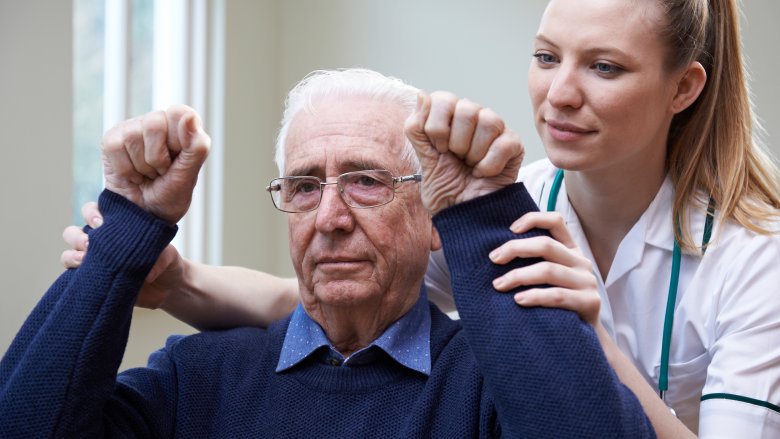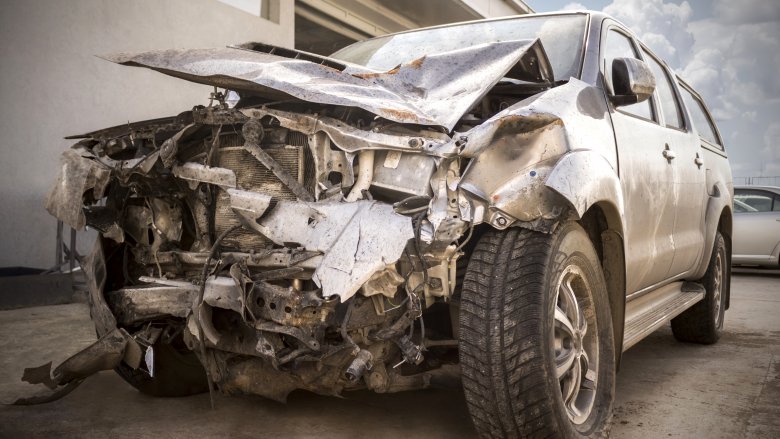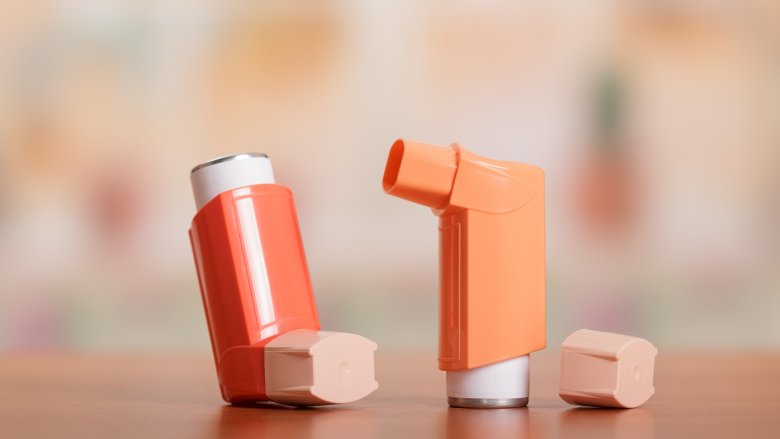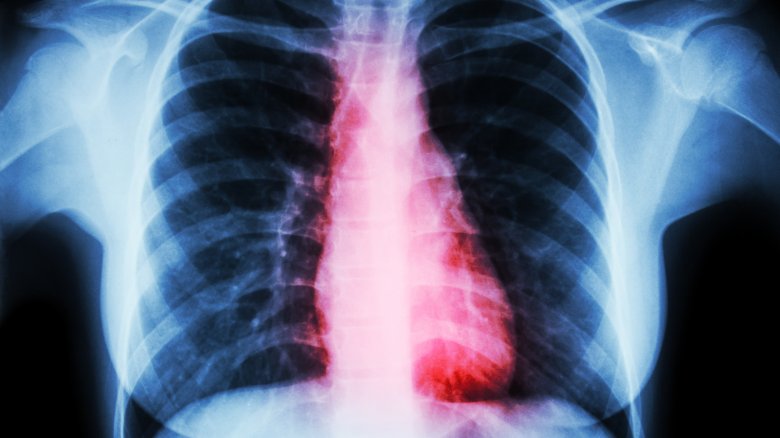How To Avoid The Leading Cause Of Death
There is only one surefire way to avoid death: Don't be born. Is it too late for that? Oh well. Now that you've made the mistake of existing, the only other thing you can really do is try to put off your death for as long as possible. If you're hoping to one day become a centenarian, or heck, a centenarian and a half, it's a good idea to know exactly what the leading causes of death actually are, so you can also understand exactly how to avoid heading down a path towards certain diabetes, kidney disease, or cancer.
Now, keep in mind that you can do all of the things on this list and still get hit on the head by a piano. And the chronic diseases that kill a lot of people are sometimes just a crapshoot of genetics and bad luck, so you can follow all of medical science's advice to the letter and still end up dying from one of them anyway. The good news is, you can reduce your chances of being the next victim of cancer or heart disease by making a few lifestyle changes. It's not a guarantee and it certainly won't grant you immortality but hey, it's better than nothing.
The number 10 cause of death: Suicide
It seems like this should be pretty easy to avoid if you don't commit suicide. For a lot of people, though, it's not that easy. Suicide is an act of desperation, and some people think it's the only way out of a life that seems unbearable. If that's you, the very first thing you should do is seek help. If you have someone you can talk to, start there. If you feel like you're alone, you can also call the National Suicide Prevention Lifeline at 1-800-273-TALK (8255).
According to the Hope Line, there are other things you can also do to get yourself out of that bad situation. First, if feelings of suicide are not new to you, make sure you have a suicide safety plan in place. It will help you spot warning signs, figure out coping strategies, and identify people you can turn to for help. Next, make sure you get away from anything you might be able to use to harm yourself, such as knives, guns, or pills. If you have any of those things in your home, leave. When you're feeling better, remove them from the environment so your home will remain a place of safety. Finally, find other activities to distract you. Some people find that running improves symptoms of depression, but you can turn to just about any hobby or activity you enjoy as a way of improving your mental state.
Take care of your kidneys
Unless you've ever been unfortunate enough to get a kidney stone, you probably don't spend a lot of time thinking about those bean-shaped things that filter your blood and make you have to get up for a bathroom break during the most important scene in Infinity War. But failing to properly care for your kidneys could lead to kidney disease, which is actually the ninth leading cause of death in the United States. Crazy, right?
According to the National Kidney Foundation, kidney disease is more of a problem for people who are age 60 or over, but that doesn't mean you can't start preventing it now, regardless of your age. Smoking is a big risk factor for kidney disease, as are diabetes and high blood pressure. So you can start by breaking up with your Marlboros, and then you can carefully explain to your morning doughnut that you'd like to see other people (you know, like fresh fruit, yogurt, and oatmeal). Overall, reducing sugar and salt in your diet will go a long way toward preventing kidney disease, and it won't hurt to shed a few of those extra pounds and take up kayaking. And maybe just don't get the 32-ounce Pepsi when you go see the next Infinity War. Your kidneys (and your desire to see Thanos get what's coming to him instead of hearing about it from someone else) will thank you for it.
Get a flu shot
If you've ever been caught up in a debate about whether you should get a flu shot, you might have been lulled into believing that influenza is not really a big deal. After all, most people who get the flu recover in a couple weeks, go back to work, and have an entertaining story to tell about how they had to clean up their sick kid's barf while running a fever of 102. No big deal, right?
So it might be surprising to hear that not only is the flu an actual big deal, it (along with pneumonia, which is a frequent complication of the flu) is the eighth leading cause of death in the United States. And you don't have to be very young, very old, or immunocompromised to develop serious complications, either.
According to the CDC, the very best way to protect yourself from the flu is to get vaccinated. Now, the flu shot is not guaranteed protection against the virus, since vaccine makers can only guess which strain will be dominant in any given flu year, and when they guess wrong you may end up only vaccinated against a less prevalent strain. So you should also take additional precautions, too, like washing your hands and avoiding contact with people who are sick. Maintaining a healthy lifestyle can also boost your immune system, so if you've been putting off that awkward conversation with your morning doughnut and Marlboros, now is the time.
Did we mention the doughnut thing yet?
As it turns out, that doughnut might be doing more than just gazing fondly into your eyes while simultaneously plotting the demise of your kidneys and your immune system. Your doughnut — and all the other doughnuts that came before it — is one reason you might be at risk for diabetes, which is the seventh leading cause of death in the United States. Don't worry, though, you're not the only one. If the incidence of diabetes keeps growing at its present rate, Harvard scientists say there will be 48 million diabetics in the United States by 2050.
There are two types of diabetes. Type 1, at least at the present time, can't be prevented because no one is really sure what causes it. Researchers do know that some people have a genetic disposition toward developing Type 1 diabetes, but the disease itself is thought to be triggered by something else, like a viral infection. Type 2 diabetes, on the other hand, is easier to nail down. Researchers think around 90 percent of all new cases of Type 2 diabetes can be prevented with a healthy lifestyle, good nutrition, weight loss, and exercise, which is good news for you and bad news for your doughnut. And hey, if you're already trying to boost your immune system and prevent kidney disease with exercise and a healthy diet, just keep doing what you're doing and you'll help prevent diabetes, too.
Don't get old
The best way to prevent Alzheimer's disease is to not get old. That's not very helpful, though, because the only way you can avoid getting old is by dying young, and we're trying to avoid death, not get there faster. So assuming you do end up growing old, you need to know how to avoid Alzheimer's disease, which affects up to one in 10 people age 65 or older and is the sixth leading cause of death in the United States.
Unfortunately, there aren't any good answers to the "how can I prevent Alzheimer's disease?" question. Researchers think there may be a heart-head connection, since roughly 80 percent of people with Alzheimer's also have cardiovascular disease. There is some evidence suggesting that patients who have "plaques and tangles" in the brain are more likely to have cognitive decline if they also have cardiovascular disease, so keeping your heart healthy may also keep Alzheimer's at bay. Some ways to do that: Eat heart-healthy foods like whole grains, fruits, and vegetables. And exercise — exercise increases the blood and oxygen flow to your brain, which helps keep brain cells healthy.
Researchers also think it's important to maintain social relationships and pursue intellectual activities, versus, you know, spending your retirement watching Wheel of Fortune. So play sudoku, join a curling league, or invite some friends over so you can all band together toward the ultimate senior citizen objective: Keeping neighborhood kids off your lawn. It's what retirement is all about.
Say goodbye to over-salted French fries
Chronic diseases like Alzheimer's and diabetes are scary, but there's nothing quite as terrifying as a medical problem that strikes you down without warning, like a bolt of lightning only way, way more common.
Stroke is the fifth leading cause of death in the United States, and the bad news is it's age-related, and there's probably a genetic component to it as well. So the older you get, the more at risk you are, and that risk only goes up if you've had a close relative who had a stroke. Even so, Harvard Health says you can still take steps to reduce your chances of having a stroke. It probably won't surprise you to hear that changing your diet is one of the first items on your to-do list. Stroke is closely associated with high blood pressure, so if you eat a lot of salty foods or foods that are high in saturated fats, you're increasing your risk of developing high blood pressure, which in turn increases your risk of having a stroke. There are also the usual suspects, like exercising, losing weight, giving Marlboro the boot, and drinking in moderation. And because diabetics are at higher risk of stroke, taking steps to avoid Type 2 diabetes will have the side effect of also reducing your risk of stroke. There's nothing like good old death-avoidance multi-tasking, right?
Oops I died
You can eat healthy food until your skin turns a pale shade of kale, and you can become the kind of anti-smoking and anti-drinking activist that drives your friends and family to order a glass of wine out of spite, but none of that will save you from the fourth leading cause of death: accidents.
The really scary thing about accidents is not that they're the fourth leading cause of death overall, but that they're the first leading cause of death for anyone between the ages of 1 and 44. So if you fall into that range, it's not diabetes and stroke and kidney disease you have to worry so much about (at least not yet), it's sheer stupidity — both your own stupidity and the stupidity of those around you.
Not all accidents are caused by boneheadedness, but a fat lot of them are. So to protect yourself from accidental death, you can start by not doing stupid things. Don't drink and drive, don't stare at your smartphone while crossing the street, and don't walk under pianos. According to Harvard Health, you can also do little things like correct your vision, maintain healthy core muscles (to help prevent falls), keep your vehicle in good working order, and not drink antifreeze because you thought it was a bottle of Gatorade. And it goes without saying that parents should babyproof the heck out of their homes — small children have to be protected from their own curiosity and from everyone else's stupidity.
Breathe clean air
Avoiding the number three cause of death is becoming a lot more difficult to do because human beings seem hell-bent on making clean air a quaint and antiquated concept. Asthma rates in the United States have increased more than 50 percent since 1980, and though no one really knows the underlying cause of the disease, what we do know is that our crappy air quality isn't making it any better. And asthma isn't the only chronic lower respiratory disease that can kill you — there's also chronic obstructive pulmonary disease (COPD), bronchitis, and emphysema, which taken together are the third leading cause of death in the United States.
The World Health Organization says death from chronic respiratory diseases can be prevented in part by reducing exposure to airway irritants, particularly tobacco smoke and air pollutants. If you already have asthma, there's not much you can do to prevent it — but if you're about to become a parent, you can reduce the chances that your baby will develop asthma. Pay attention to your own health, the health of your environment, and, of course, the things you eat.
If you're working to protect yourself from the eighth leading cause of death (the common flu), that also has the side effect of reducing the chances that your COPD or asthma will kill you. In particular, children with asthma are more likely to develop deadly flu complications, so getting vaccinated not only protects you, it also protects the most vulnerable people around you.
The big C
Cancer is damned scary. If you've never had cancer, you probably know someone who's had cancer. You've also probably known someone who died from cancer. The reason cancer seems like it's everywhere is because it is — according to the American Cancer Society, if you're a man, your lifetime risk of developing some kind of cancer is 39.66 percent, or more than 1 in 3. Your chances of dying from cancer are 22.03 percent, about 1 in 5. If you're a woman, your chances are slightly better, but only just: 37.65 percent and 18.76 percent, respectively.
So can you prevent cancer? Sort of. Many cancers have a genetic component, and some are just bad luck. But your lifestyle does have a big impact on your risk, and there are definitely things you can do to reduce that risk. First, you can ditch Marlboro, if you haven't already done that. Smoking doesn't just increase your chances of lung cancer, but other malignancies like cancer of the throat, pancreas, and kidney. To avoid skin cancer, don't get too much sun. And there's the obvious stuff, like eating right, exercising, telling that doughnut you don't love it anymore, etc. And finally, just be smart. Get vaccinated against hepatitis B, which is associated with liver cancer, and HPV, which can cause cervical cancer in women. Don't drink excessively. And if your doctor wants you to have a cancer screening, get a cancer screening. That is all.
And the number one cause of death is...
Heart disease. It seems almost anticlimactic because so much of the list above is stuff we hear about all the time. Heart disease doesn't really get as much airtime as cancer, Alzheimer's, and good old-fashioned accidents, but there it is — the number one killer of humans in the United States.
Most of the strategies for preventing heart disease are going to sound really familiar. According to the Mayo Clinic, smoking, a sedentary lifestyle, a poor diet, being overweight — all these things will put you at risk for America's top killer. So to avoid heart disease, you have to ditch your couch potato ways, eat like a small furry animal with long ears, and just adopt a healthier lifestyle in general. Let's hope you've already internalized those basic steps because remember you will also need them for the ninth, eight, seventh, sixth, fifth, and second most frequent causes of death.
Heart disease is also closely related to stress, so if you have a hard time managing your stress level, now is the time to take up a hobby, like knitting, painting, drone flying, and telling kids to stay off your lawn. Getting enough sleep helps, too, so if you aren't regularly clocking eight hours, set a bedtime and stick with it. And after you do all that, you should stop worrying. Death eventually comes for everyone, no matter what you do to try and stop it.


